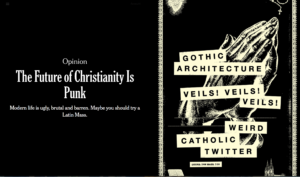 Here are a few noteworthy paragraphs behind the thesis of the provocatively titled New York Times opinion essay from Dr. Tara Isabella Burton.
Here are a few noteworthy paragraphs behind the thesis of the provocatively titled New York Times opinion essay from Dr. Tara Isabella Burton.
* More and more young Christians, disillusioned by the political binaries, economic uncertainties and spiritual emptiness that have come to define modern America, are finding solace in a decidedly anti-modern vision of faith. As the coronavirus and the subsequent lockdowns throw the failures of the current social order into stark relief, old forms of religiosity offer a glimpse of the transcendent beyond the present.
Many of us call ourselves “Weird Christians,” albeit partly in jest. What we have in common is that we see a return to old-school forms of worship as a way of escaping from the crisis of modernity and the liberal-capitalist faith in individualism.
Weird Christians reject as overly accommodationist those churches, primarily Mainline Protestant denominations like Episcopalianism and Lutheranism, that have watered down the stranger and more supernatural elements of the faith (like miracles, say, or the literal resurrection of Jesus Christ). But they reject, too, the fusion of ethnonationalism, unfettered capitalism and Republican Party politics that has come to define the modern white evangelical movement.
* Weird Christianity is equal parts traditionalism and, well, punk: Christianity as transgressive alternative to contemporary secular capitalist culture. Like punk, Weird Christianity has its own, clearly defined aesthetic. Many Weird Christians across the denominational and political spectrum express fondness for older, more liturgically elaborate practices — like the Episcopal Rite I, a form of worship that draws on Elizabethan-era language, say, or the Latin Mass, or the wearing of veils to church.
* The Weird Christian movement, loose and fledgling though it is, isn’t just about its punk-traditionalist aesthetic, a valorization of a half-imagined past. It is at its most potent when it challenges the present, and reimagines the future. Its adherents are, like so many young Americans of all religious persuasions, characterized by their hunger for something more than contemporary American culture can offer, something transcendent, politically meaningful, personally challenging. Like the hipster obsession with “authenticity” that marked the mid-2010s, the rise of Weird Christianity reflects America’s unfulfilled desire for, well, something real.
Read the entire piece HERE.
